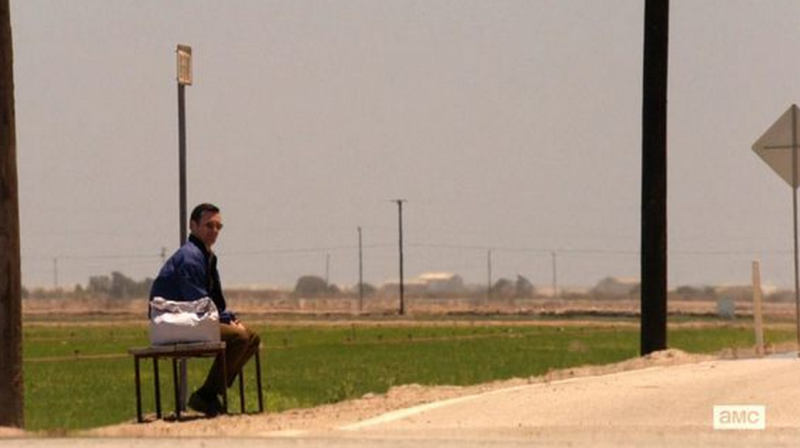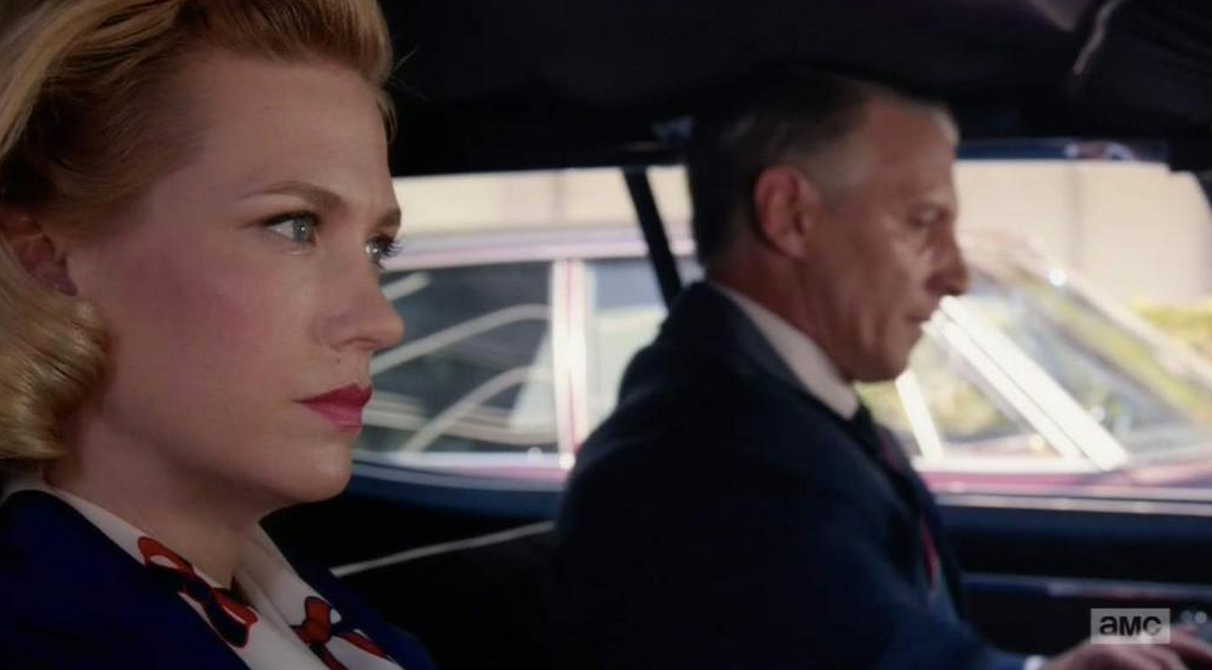'Mad Men' Season 7, Episode 13: ‘The Milk And Honey Route’

As this was the penultimate episode of the entire eight-year saga, tonight’s show needed to deliver some big blows. It came through: in terms of plot and story development, this was the most eventful hour we’ve gotten all season.
READ MORE: ‘Mad Men’ Asks ‘Is That All There Is?’ In Season 7 Part 2 Premiere ‘Severance’
In a deliciously saccharine twist, Pete Campbell, everyone’s favorite little wiener, becomes slightly less of a wiener. After a meeting with a philandering executive, to whom Pete gives a grand moralizing speech about loving the one you’re with instead of “always looking for something better,” Pete realizes he’s made a huge mistake letting go of Trudie. Excitedly, he visits her at four in the morning, announcing his plans to swoop her away to “beautiful and wholesome” Wichita. He’s just received a job offer, he explains, with an airline there. In Wichita, they can raise their daughter in corn-fed familial bliss. “We’re entitled to more,” he tells Trudie. “We’re entitled to something new!” Cue kiss and orchestral swooning.
READ MORE: 'Mad Men' Season 7, Episode 11: 'Time & Life'
Although he hasn’t come around full circle— he’s still searching for “more,” for “new,” instead of appreciating what he has — this is a big moment for the wiener.
Betty, however, is much closer to the end of her arc. Think back to Season One: she was a petulant little girl, a side character infantilized in her relationship with Don. Now, she’s a leading lady in her own right who’s grown up and taken control of her life, her going back to college this season symbolizing her maturation into a full-grown adult.
Just in time, apparently. She has cancer, and it’s bad.

Twitter, @mashable.
When she gets the diagnosis, the doctors try to give control of her medical treatment to Henry, who tries to buy her as much time as he can. But Betty stays in charge. She wants to go out on her own terms. Her decision is, on the surface, immature — the goodbye letter she gives Sally is not a loving farewell but instructions on how to dress her for the funeral, and we suspect that, as Sally says, she’s reveling just a little in the beautiful tragedy of it all. But she’s finally making her own decisions, and not only that, she’s trying to make the ride better for Sally than it was for her. “I watched my mother die, and I’m not going to make you go through that,” Betty tells Sally, and sends her back to boarding school with nary a hug or goodbye.
It seems cold, as Betty’s scenes with Sally usually do. But her pushing Sally away at the end is her final act of characteristically mangled, but loving, motherhood: she may not be able to make her own situation better, but she can spare Sally from the pain she went through in her own development. Again, big moment.
Don’s not dying (yet), but he also gets a chance in this episode to look back on his life, come to terms with where he’s ended up, and set a mini-Don on a better path. After watching it three times, it’s a surprisingly satisfying almost-ending.
Don’s been doing spiritual shedding the entire season: first the wife, then the apartment and the fortune. Last week, he walked out on his job. Out of New York altogether, actually, in favor of a spiritual road trip across the endless Instamatic-hued plains of middle America. (This photography student isn’t complaining. Side note: could the dreamy filming represent Don finally arriving in his Kodak-tinted paradise?)
Driving through Wisconsin, Minnesota, Wyoming, Don’s only belongings at this point are his car and the contents of a Sears shopping bag. Stuck with car troubles at a small-town motel, he encounters a fast-talking kid who reminds him of his Dick Whitman roots. When the kid tries to steal money, Don sees himself; he makes the kid return the money, saying, “If you take that money, you’ll have to become someone else.” Not only does he spare the kid the anxiety of living as a con artist — which Don knows all too well — he gives the kid his car, and with it the opportunity to go somewhere and make something of himself.
Don’s letting go of everything — people, material possessions, his internal Dick/Don anguish. And because of that — because he’s maturing and letting go, in the same way Betty is letting go of a battle she can’t win — he seems to be stepping out of the “Don cycle” of spectacular implosions and spectacular rebirth.
Sitting on the bus stop bench with his one remaining bag of stuff, Don’s smiling in the last scene. But it’s not clear if this is an end or a beginning. Is he stepping toward something new like Pete, towards some kind of quieter contentment? Or is he, like Betty, like a true tragic hero, only fully self-actualized in the moment of his demise?
This optimist’s still rooting for the former.
Contact Neon Tommy Senior Arts Editor Gigi Gastevich here.



